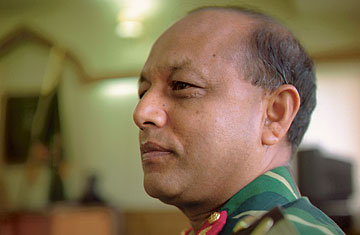
The Law
Moeen's vision for order is contested by Bangladesh's political parties
To reach the office of general Moeen Uddin Ahmed in Dhaka's military cantonment, a foreign journalist must pass three security checkpoints and endure the searches of numerous stern soldiers. Broad-shouldered aides then lead you, with hushed solemnity and even a hint of fear, toward the chambers of their commander in chief. One would expect a grim, towering leader behind the headquarters' oak doors, but General Moeen is conspicuously diminutive and unassuming, hardly looking the part of the South Asian strongman he very well may be. Yet Moeen pulls few punches when speaking of his country's politics and its democracy's many failings. "No systems of government are bad in their own right," says Bangladesh's top-ranking military officer with a thin smile. "It's the human beings who make it so."
Little is known about the 55-year-old Moeen other than that he, more than anybody else in this nation of 150 million, is the man who holds the keys to its future. Over a year and a half ago, Moeen's army waded into a turbulent political crisis, postponed parliamentary elections and helped install a caretaker government of state-appointed bureaucrats known as "advisers," headed by a former World Bank executive, Fakhruddin Ahmed. Since then, Bangladesh has remained under emergency rule: civil liberties have taken a hit and thousands of suspected troublemakers picked up in midnight sweeps. Behind all this, it's commonly understood that Moeen and the military really run the show. The Harvard-trained general was made army chief just under three years ago and is coy about the extent of his power. In his first major interview with foreign media, he told TIME of the urgent need to clean up Bangladesh's cynical, venal and corrupt politics. Moeen looks back to what preceded Jan. 11, 2007, when the army intervened, and recalls chaos: "The situation was deteriorating very rapidly. The world saw people dying in Dhaka's streets. Was this the way forward?"
But the way forward looks as murky now as it did 18 months ago. Despite Moeen's insistence that elections will go ahead as planned by the end of this year, the optimism that first greeted his arrival on "1/11," as the epochal event is known there, is gone. Ever since achieving independence from Pakistan in 1971, impoverished, unfortunate Bangladesh has slumped down its path toward democracy. When not under the rule of autocratic generals — as it was twice in the past — it has been the province of two mammoth, bickering political parties, the Awami League (AL) and the Bangladesh Nationalist Party (BNP). Their legacy of craven politicking and brazen plundering buoyed the current army-backed regime into power. But few believe Moeen is truly democracy's savior when the military has so consistently impeded its growth in the past. "As Bangladeshis, it's like we're riding a tiger," says Gowher Rizvi, director of the Ash Institute for Democratic Governance at Harvard University. "How do we get off?"
The Caged Begums
Two fixtures of the country's checkered politics remain at the center of things in Dhaka. Bangladesh's Parliament complex, designed by the noted American architect Louis Kahn, looms out of a verdant expanse in the heart of the capital, encircled by palm fronds and crisscrossed by waterways. What was meant to be the cradle of Bangladeshi democracy — described by Kahn as "a many-faceted precious stone, constructed in concrete and marble" — has over the past year been the prison ground for the government's most prominent political detainees: Sheikh Hasina and Khaleda Zia.
The two women, daughter and widow, respectively, of the founders of the AL and the BNP and still the parties' leaders, have dominated Bangladesh's political landscape for over a decade, swapping spells as Prime Minister. But they ended up behind bars, casualties of an anticorruption drive launched by the caretaker government post-1/11. "Before, it was a free-for-all," says Muzaffer Ahmed, a respected academic and the head of Bangladesh's chapter of Transparency International, which once ranked the country the most corrupt in the world. "Public funds were being extorted, embezzled, misused in all sorts of ways." Prominent figures in both parties have been charged for crimes ranging from tax fraud to murder; dozens of cases prosecuting politicians on graft are ongoing.
It's this history of political dysfunction and avarice that Moeen claims he wants to expunge. The caretaker government has prided itself on its efforts to rebuild Bangladesh's democratic institutions — from cleaning up a voter roll that had some 12 million fake names listed on it to laying the groundwork for more effective regulatory commissions. With such steps and the examples set by the government's anticorruption campaign, Moeen believes Bangladeshis can be weaned off their fraudulent politicians. "The people in the villages are very docile, they are kind-hearted," says the general. "You can be a criminal, but you just need to go and cry, and they will accept you."
The military takeover following 1/11 was widely accepted and applauded at first. In the run-up to parliamentary elections, Zia's incumbent government attempted to manipulate the democratic process. Mass protests from the AL plunged the country into chaos and nationwide hartals, or strikes, paralyzed the country. Such was the exasperation of members of civil society and the international community at the time that, according to an April report of the International Crisis Group, diplomats from a number of Western countries, including the U.S., secretly urged Moeen to intervene. Though Moeen insists he and his top brass are operating purely "in aid of civil power" until elections are finally held, few in Dhaka doubt that anybody but the generals are calling the shots behind the scenes in this interim government.
